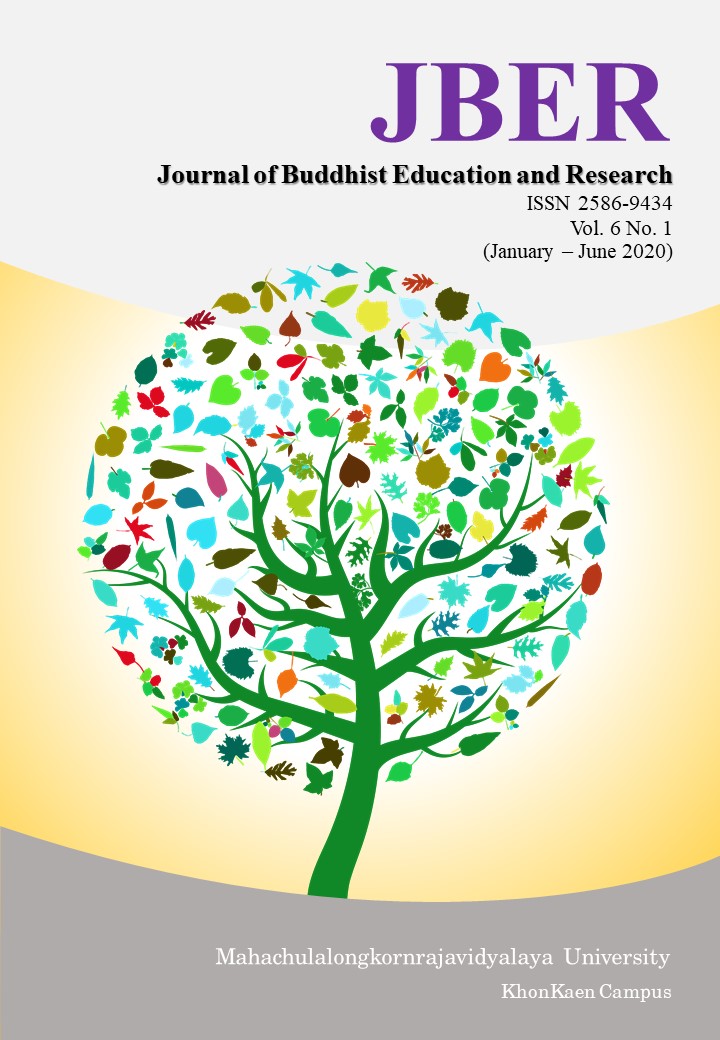AN APPROACH OF TRAINING ACTIVITY APPLICATION TO PROMOTE VIRTUE AND ETHICS FOR SECONDARY SCHOOL STUDENTS OF KANLAYANAWAT SCHOOL KHON KAEN PROVINCE
Keywords:
Activity guidelines, Promote morality and ethicsAbstract
The aims of this research were: 1) to study the Buddhist principles to promote morality and ethics; 2) to study of the use of activities to promote morality and ethics of high school students in Kanlayanawat School, Khon Kaen Province; 3) to propose the guidelines for using of activities to promote morality and ethics for secondary school students in Kanlayawat School, Khon Kaen Province.
From the descriptive analysis, it was found that the Buddhist principles including Four Iddhipāda (Path of Accomplishment), Four Bhāvanā (Cultivation), Four Saṅgahavatthu (Bases of Social Solidarity), Pañca-Sīla (Five Precepts) and Pañca-Dhammas (Five Ennobling Virtues) are applied to train the students to be generous, to have good speech, to consistently behave, to be disciplined, economical and honest, to respect monks, teachers, parents, to be more concentrated, to have gratitude, to understand the dhammas and apply them in their daily lives and to observe precepts constantly without persecution of the others. The activities to promote morality and ethics cause the students to develop their mental stability and strengthen their mental health.
Using of activities such as Buddhabutra Camp, chanting, meditation, merit making ceremonies, candlelight activity on religious days to promote morality and ethics for secondary school students Kanlayawat School, Khon Kaen Province causes the students to apply the Buddhist principles expressed physically, verbally and mentally and well adapt them in the way of life, in school and at work. They learn to devote their time, to give their belongings and be humble to monks, parents and teachers. They become more responsible and better behave. Applying Buddhist principles in education and other areas is consistent with current life in society. Regular insertion of morality and ethics in teaching and learning activities causes the students to behave according to the dhammas. Therefore, it can be said that morality and ethics are important for youth development and citizens of the country to have quality. Every school therefore has a duty to instill morality and ethics for the nation's youth to have a good behavior and to behave appropriately as a good citizen of the nation.
References
กรมวิชาการ กระทรวงศึกษาธิการ. (2545). หลักสูตรการศึกษาขั้นพื้นฐาน พุทธศักราช 2544. กรุงเทพฯ: โรงพิมพ์คุรุสภาลาดพร้าว.
กษมา วรวรรณ. (2542). แนวคิดและทฤษฎีการพัฒนาคุณธรรมจริยธรรมที่เน้นความมีวินัยและประชาธิปไตย. กรุงเทพฯ: กรมวิชาการ กระทรวงศึกษาธิการ.
ดวงเดือน พันธุมนาวิน. (2544). ทฤษฎีต้นไม้จริยธรรมการวิจัยและการพัฒนาบุคคล. (พิมพ์ครั้งที่ 4). กรุงเทพฯ: บัณฑิตพัฒนบริหารศาสตร์.
บรรจง ชูสกุลชาติ. (2531). เป้าหมายหลักและกลยุทธ์ในการบริหารการศึกษายุคใหม่. กรุงเทพฯ: โรงพิมพ์คุรุสภาลาดพร้าว.
มหาวิทยาลัยมหาจุฬาลงกรณราชวิทยาลัย. (2539). พระไตรปิฎกภาษาไทยฉบับมหาจุฬาลงกรณราชวิทยาลัย. กรุงเทพฯ: โรงพิมพ์มหาจุฬาลงกรณราชวิทยาลัย.
Jean Piaget. (1997). the Moral Judgment of the Child. London: Routledge & Kegan Paul Ltd.
Maslow Abraham. (1987). Motivation and Personnality. New York: Harper and Row Publishers.





